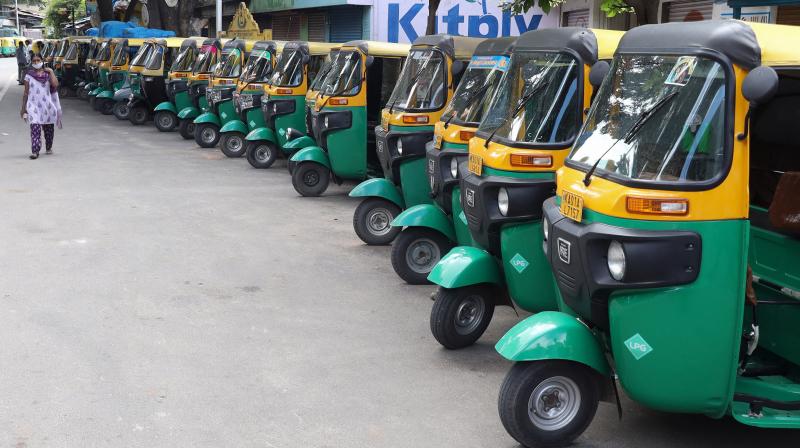Shashi Warrier | My first brush with a Madras autowallah

These days, when I have time on my hands, my mind drifts back to old times, and to surprises, of which there are many. Back in the 1970s, my elder brother went off to college, to a hostel and to what I thought was freedom. Envious, I nagged my parents into allowing me to go on a longish train ride from our home in Trivandrum to Madras, some twenty hours away by the metre-gauge line that was, in those days, the sole direct rail route between those cities.
My parents saw me off with Rs 50/- for expenses, tickets both ways, instructions on what not to eat on the train, and written instructions on how to get to my cousin’s place in Besant Nagar from Egmore railway station.
Also, for emergency use, I had the phone number of a friend of Dad’s, and one final instruction relayed from my Madras cousin: Don’t ever take an autorickshaw in madras because the drivers are all cheats!
The train left Trivandrum in the afternoon, and I managed to follow Mom’s instructions on food until dinner-time, when I succumbed to temptation and polished off a fragrant but forbidden chicken biryani.
The night was pleasant and I slept well enough, even though the berth was merely a plank, and the ride was bumpy as it always was on metre-gauge railway lines.
I came awake to sunlight, a queue for the toilets, which I wanted desperately to use, and the sight of fellow passengers packing their bags, preparing to get off.
I asked one of them how long it would take to get to Madras, and he replied, “Less than ten minutes.” No hope, evidently, of making it to the toilet before that. I asked him about the buses my cousin had written about, and he replied, “Oh! No problem. There’s one every twenty minutes. You’ll get to Besant Nagar in an hour.”
That roiling stomach made an hour look like an eternity. Dad’s colleague lived in Adyar. “What about Adyar?” I asked. “Is that closer?”
“Yes,” he said. “About half the distance.”
By now the train was drawing up at the platform and there was a surge to the door. Larger passengers loaded with luggage shoved me out of the way in their rush to get wherever they were going. Perhaps they, too, needed a toilet, I thought, and waited for my turn to step off the coach.
Saving half an hour seemed important enough, I thought, to justify calling Dad’s friend to ask if I could go straight to his place.
There were coin telephones in the concourse of the station. In those days the coin telephone system worked as follows: you got your coins ready and dialled the number you wanted to call. When the connection was made, you would be able to hear whatever the person you called said, but he or she wouldn’t be able to hear you until the coin slotted into place.
The phone wanted a ten-paisa coin, which I had, but what I didn’t know was that it required a “new” or aluminium ten-paisa coin, not the steel ones I had. When I dialled Dad’s friend, he couldn’t hear me: all he knew was that some stranger was trying to get through to him.
I gave up after the second attempt and decided that my internal situation had now become an emergency, and so, against my cousin’s emphatic advice, I took an auto, the first in a queue. The driver was a tall, lean, bare-footed man in an orange lungi and a khaki shirt, with frizzy hair, a drooping moustache, and red eyes. I distrusted him on sight, but since the queue was rigorously enforced, I had no choice.
When I got into the vehicle and tried to tell him where I wanted to go, we discovered that he knew just enough Malyalam and I knew just enough Tamil for us to communicate basics. I remembered Mom telling me that the auto fare to Besant Nagar would be eight to ten rupees. This being my first time alone in a strange city, I kept my eyes glued to the meter as, in a very short while, it went up to what I thought was Rs 13.
I swallowed, collected my scattered wits, and told the driver there was something wrong with the meter. He stopped and got out of the vehicle to look at the meter, and burst out laughing, saying that it was showing only Rs 1.30… While I shrank back into the passenger seat, he resumed the ride, his mood vastly uplifted by my display of foolishness.
When we got to the Besant Nagar bus stop, I couldn’t find the sheet of instructions I’d been given, and had no idea how to get where I wanted. My emergency was now compelling, and I needed to find my cousin’s house before things broke loose.
The driver saw that I was in doubt, and asked me where I wanted to go. I told him my cousin’s name, that she lived somewhere in the neighbourhood, and I didn’t know exactly where .
He knew that I was a stranger, a kid, didn’t know the language, and was in some kind of trouble. He parked his vehicle, and told me in simple Tamil to follow him. He asked a couple of passers-by where so-and-so lived, and, in a couple of minutes, found their street. As we entered it, I saw my cousin at a second floor balcony watching our progress… Jackpot!
There was just enough time to hand the driver a ten-rupee note before rushing up the staircase: I’ve never climbed four flights of stairs that fast, and I’ll probably never forget the relief that followed. But the enduring memory is of that evil-looking auto man who turned out a gem...

